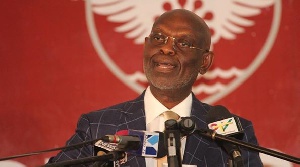Former Minister of Finance in the erstwhile Rawlings regime, Prof. Kwesi Botchwey, says Ghana’s economic situation this year (2014) could become worse because, whiles the country has projected revenue in the region of 24 billion cedis, statutory spending and other expenditures will account for 102% of total revenue; leaving a negative of 200 million cedis for expenditure on infrastructure.
He was of the opinion that the country for many years has lived beyond its means and the time has come for macro-economic stability to be restored. He posited that if the evidence of history is anything to go by and the constraints on the economy, transfers from the budget for the payment of utilities would not work.
“I’ll like to repeat without exaggeration that the Ghanaian economy is in a crisis," he said; pointing to high inflation, double-digit budget deficit, depreciation of the cedi and the general lack of growth in the economy. GDP growth, according to him, had declined from 9.4 per cent in 2011 to just 3.4 per cent in 2013.
Prof Botchwey, who is Ghana's longest serving Finance Minister, was delivering a lecture in Accra on the theme “State of the Nation’s Political Economy and the Role of Civil Society," as the third speaker in the Distinguished Speaker Series organised by the Central University College.
A holder of an LL.B. from the University of Ghana, a LL.M from Yale Law School, and a doctorate from the University of Michigan Law School, Prof Botchwey, who championed many International Monetary Fund (IMF) interventions and tried to put the country's economy on track pointed out that the country’s credibility in the eyes of the international market and even within the country itself appears eroded.
He stressed that whether the country opts to borrow from the international markets or the IMF, their conditions are not markedly different, adding that we need to have “clearly spelt out policies which would convince our partners that we are able to pay for the loans we are taking," otherwise, it would even be “difficult for the creditors to give out the loans in the first place”.
“The country can decide that we will not go to IMF for funds; we can decide that instead of medium term drawing at lower cost from IMF, we will borrow from international markets at greater costs and short tenure and with pretty much the same conditions.
It does not matter which of the choices we make, when we do not have clearly spelt out policies which would convince our partners that we are able to pay for the loans we are taking then it would even be difficult for the creditors to give out the loans in the first place,” he said.
The former Finance Minister also backed Dr. Mahamudu Bawumia's assessment of the economy.
In a lecture delivered in May at the same podium, the former Deputy Governor of the Bank of Ghana painted a rather gloomy picture of the Ghanaian economy, stressing that a bailout by the IMF was inevitable if the government's management of the economy did not improve.
Prof. Botchwey, on Tuesday evening, said he did not plan to dispute the claims made by Dr. Bawumia.
"I offer no rebuttals. I do agree with much of what he said," he said.
General News of Wednesday, 4 June 2014
Source: peacefmonline













